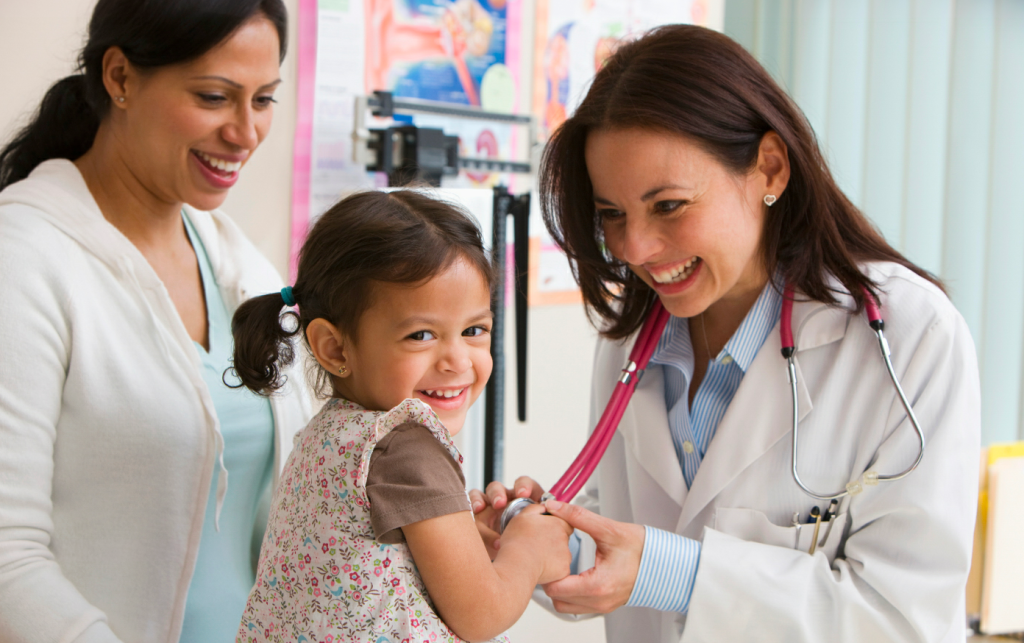Topics
Experts at Texas Children’s Hospital share tips on keeping your family healthy this winter

Though Texas winters are usually considered mild compared to much of the country, this time of year can present special health challenges for children and adults alike. Students are in school and spending more time indoors — which can create a perfect environment for the spread of highly contagious viral illnesses like colds and flu, as well as COVID-19 and respiratory syncytial virus (RSV) infection.
Here are some tips on ways that children and families can stay healthy this winter — and every day throughout the year.
Influenza and COVID-19 Trends and Vaccines
Flu vaccine
Influenza, commonly called the flu, is a contagious respiratory illness caused by viruses that infect the nose, throat and lungs. For many people, the symptoms are like those of a severe cold, but it is important to understand that the flu can be fatal. Each year, influenza results in thousands of hospitalizations in children under five years of age.
In both the Houston and Austin areas, our Texas Children’s pediatricians are seeing high volumes of children sick with both influenza A and influenza B. We are also seeing that the number of children receiving flu vaccines has decreased from previous years, and that’s a cause for concern. Flu vaccines are safe, effective and easily accessible — and they save lives. While the flu vaccine may not prevent someone from getting the flu, it is extremely effective in preventing severe outcomes like hospitalization and death.
For parents who have not already gotten flu shots for themselves or for their children, we strongly encourage them to do so as soon as possible.
Updated COVID-19 vaccines
We have been seeing increasing levels of COVID-19 infection in this part of the country in children and adults for several weeks, and with school back after the holidays, there is concern that the incidence may continue to rise. All of our Texas Children’s Pediatrics pediatric practices offer the updated Pfizer COVID-19 vaccine, which is approved for everyone 6 months of age and up.
The updated vaccine works to boost protection that has declined since the previous vaccination, and it targets the most recent variants that are more contagious and immune-evading than previous variants. This updated vaccine should provide good protection against the most dominant strain currently circulating in the US, which is the JN.1version. We strongly recommend that children and adults consider getting the updated vaccine.
Children and adults can safely receive both the flu vaccine and the updated COVID-19 vaccine at the same time.
How to schedule an appointment
Parents can schedule vaccinations at all Texas Children’s locations, including Texas Children’s Pediatrics (TCP) in Houston, Austin and College Station:
• Through MyChart
• By calling their TCP practice (TCP practices are offering only the Pfizer vaccine)
• By visiting Texas Children’s COVID-19 Vaccine Hub
If your child is experiencing symptoms of Covid or Flu, Texas Children’s Urgent Care offers virtual visits anywhere in Texas, that allow parents to meet with a provider to receive the care they need without coming to the hospital or clinic in person. These appointments are available 7-days a week from 9a-11p Visit MyChart Virtual Visits to learn more.
What parents need to know about RSV
Though RSV is a common seasonal virus, it is the leading cause of infant hospitalization year after year. Older children with RSV typically have symptoms like those of a common cold; however, for young infants or those with special medical problems, RSV can become severe or even life-threatening. This year, an immunization for RSV (NOT a vaccine) has become available for all babies less than eight months of age, as well as for a select group of children through eighteen months of age with specific underlying risk factors. However, this product has been in extremely limited supply. In addition, an RSV vaccine is now available for pregnant women between 32-36 weeks of gestation. This maternal RSV vaccine should offer protection to a term baby during the first six months of life. The RSV immunization for babies and RSV vaccine for pregnant moms are extremely effective in preventing significant illness from RSV infection. Since there is no actual medical treatment for RSV infection, prevention is the best approach.
What parents can do to help protect their children:
• Understand what puts babies at high risk. While all babies can potentially develop an infection from the virus, there are a few factors that can increase a child’s risk of developing severe RSV-related infection, including:
o Being born prematurely (under 37 weeks gestation).
o Having chronic lung disease.
o Being born with certain types of heart disease.
• Take steps to prevent RSV infection. RSV is very contagious and can be spread easily through touching, sneezing and coughing. The virus also can live for hours on surfaces such as tissues, countertops and toys. It’s important to take steps to protect all babies from contracting the virus, including frequently washing hands, toys and bedding, and avoiding crowds. It’s also important for parents whose healthy babies contract RSV to avoid spreading the virus to babies who may be more vulnerable.
• Know the symptoms of serious RSV infection. RSV can result in more alarming symptoms than those resembling the common cold, including:
o Severe coughing or wheezing.
o Difficulty breathing or rapid, gasping breaths.
o Blue color on the lips, mouth or under the fingernails.
o High fever.
o Difficulty feeding or decreased intake of liquids.
o Excessive fatigue.
If a child exhibits any of these symptoms, parents should contact their child’s physician or seek medical care.
As is the case with virtually all other viral respiratory infections, the management of RSV is supportive. Dehydration is a common complication of RSV, so maintaining good hydration is critical. Reducing moderate to high fever with fever-reducing medications can mitigate the risk of dehydration, as well as provide comfort.
Parents who suspect their baby may be high-risk should contact their pediatrician. The pediatrician can discuss options for potential RSV protection, which can help protect high-risk infants from developing serious RSV infections.
Healthy habits to protect children
Sleep
There’s a reason doctors ask about sleeping patterns during checkups. Sleep helps the body restore and repair itself, and it is so important for growth, development and staying healthy. Parents should help ensure that their children are getting enough sleep — the recommendation for school-aged children is nine to 11 hours per night. When they don’t get enough, they are definitely at increased risk of getting sick.
Diet
Like good sleep, a well-balanced diet is essential for maintaining good health. A poor diet can lead to inflammation in the body, which will stress the immune system and lead to further illness. When children’s diets include plenty of fruits and vegetables, they’ll receive all kinds of natural immune-boosting vitamins. Offer healthy, well-balanced meals, including afternoon snacks consisting of fruits and vegetables. A pediatrician can determine whether vitamins are recommended.
Exercise daily and limit screen time
Lack of physical activity is a major cause of illness. Children (and adults) need time away from screens to thrive. Try limiting all screen time to one hour on school nights and two hours on the weekend. In addition, try to ensure that children get one hour of physical activity outside of school every day. Another benefit of exercise: it’s linked to better academic performance and improved mental health. Make it a family effort!
Hand washing
Doctors agree that hand washing is crucial to limiting the spread of illness — especially before and after meals, after using the bathroom and after being in public spaces. Hand washing with regular soap is the best way to prevent germs, as there is no evidence supporting the use of antibacterial soaps or heavy-duty cleaners for children. Using soap and water is the way to go!
Keep children home when they’re sick
When children are sick, try to keep them at home and make sure they get plenty of rest, fluids and supportive care. Giving children a chance to get some extra sleep and fight off minor illnesses not only minimizes the spread of disease in child-care settings, but also increases their chance for a quick recovery. When children go back to school too quickly — even after a mild illness — they are more likely to catch a secondary infection, which could prolong symptoms.
Limit stress
Physical and mental stress can have a detrimental effect on the immune system. When the body is under stress, immune function declines. During the school year, parents should be especially conscious of their children’s stress levels and help minimize them when possible.
Lara Shekerdemian, MD
Pediatrician-in-Chief, Texas Children’s Hospital
Chair, Department of Pediatrics, Baylor College of Medicine
Stanley Spinner, MD
Chief Medical Officer and Vice President, Texas Children’s Pediatrics and Texas Children’s Urgent Care
Associate Clinical Professor, Baylor College of Medicine




